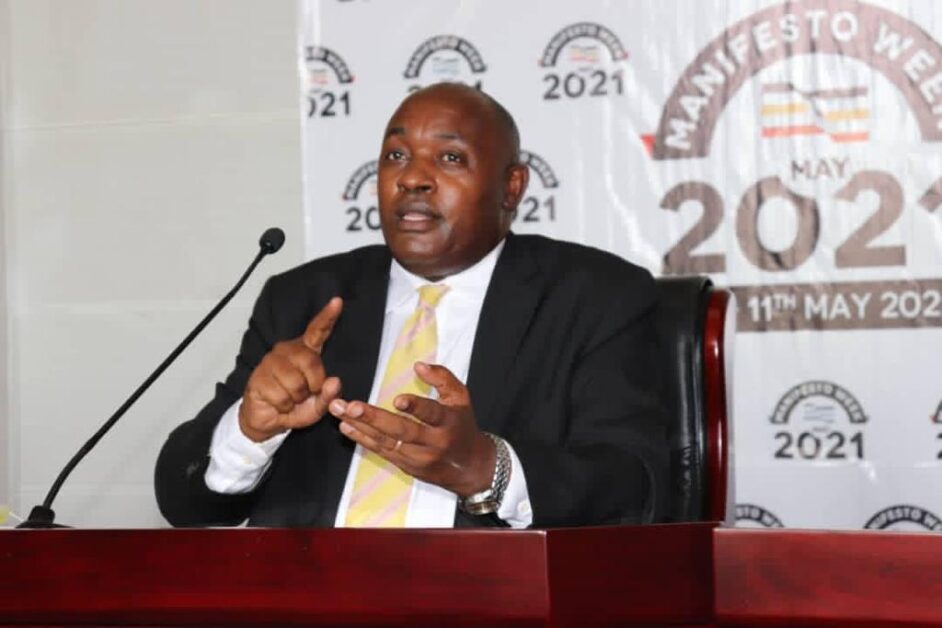Minister Chris Baryomunsi while giving his ministry’s performance in the last five years
The State Minister for Housing in the Ministry of Lands, Housing and Urban Development, Chris Baryomunsi has said that the ministry is satisfied with achievements recorded in implementing promises in NRM manifesto.
He adds that the ministry is ready for the 2021-2026 manifesto implementation.
Baryomunsi made the remarks on Friday while presenting the performance of his ministry in the past five years at the OPM auditorium.
“We are satisfied that we have been able to implement our commitments as we prepare to go into 2021-2026,” Baryomunsi said.
He highlighted some of the ministry’s achievements as 22 Ministry Zonal Offices (MZOs) established (services closer to the people), all Freeholds, Leaseholds and Mailo titles digitalized, Certificates of Customary Ownership (CCOs) digitalized, built a Records and Archival Centre at Entebbe, held Public Awareness Open days and Barazas on land matters, developed and disseminated land related information materials, established a One-stop Centre where search letters are issued in less than two hours, established 12 Continuously Operating Reference Stations (CORS) in the districts of Moroto, Masindi, Kibaale, Lira, Soroti, Gulu, Masaka, Mbale, Jinja, Arua, Entebbe and Fort Portal (all the 12 CORS have been linked to the National Control Centre (NCC)), drafted Land Acquisition Bill, 2020; incorporated a total of 606 Communal Land Associations (CLAs), issued 29,969 Certificates of Customary Ownership (CCOs), mapped a total of 35,800 customary land parcels and acreage of 21,500.3 ha, issued eviction guidelines during COVID-19 pandemic lockdown to protect occupants from illegal land.
The Ministry also carried out training and capacity building for Land Administration institutions and collaborated with JLOS institutions and other stakeholders in handling land matters.
Baryomunsi added that the amount for the Land Fund was increased from UGX 42 billion to UGX 111.5 billion and that so far 259,204.1 acres have been bought.
The ministry also surveyed 7,035 parcels of land in Kibaale, Kagadi,Kakumiro, Nakaseke, Nakasongola and Bunyangabu districts and processed 2,975 certificates of title for lawful and bonafide occupants.
“The rest are in process,” he said.
According to Baryomunsi, the ministry is working with GIZ in Mityana, Mubende and Kassanda in addressing landlord-tenant relationships.
In the next government, lands ministry plans to implement the additional initiatives required to create an efficient and effective land administration system, implement the National Land Policy and reform the relevant laws to be in consonance with it and undertake systematic registration of individual and communally-owned land.
The Ministry also plans to implement a programme of action for strengthening institutions and mechanisms for land dispute resolution and mediation at the Local Government level, increase the amount of money allocated to the Land Fund, continue to enforce the law to protect the rights of lawful and bonafide tenants and implement the National Housing Policy to guide the development of housing, including social housing to address the housing deficit.

The Ministry also plans to attract international financiers to partner with government and the private sector to provide affordable housing finance and real estate projects in the country, increase the role of the public sector in putting up houses in organized settlements both in rural and urban areas, encourage the formation of a housing provident fund where workers make regular savings for them to build personal houses and support the development of housing co-operatives as a vehicle for delivering affordable houses among others.
Challenges
Some of the challenges facing the ministry of lands include the increasing land evictions, increased fraudulent land transaction, inadequate Land Fund to resolve issues of tenanted land, limited Government land for development and high cost of land acquisition for development Projects, Lack of funding for operationalizing the Land tribunal system.
Other challenges as listed by Baryomunsi include encroachment on Government Land and other Eco fragile lands, high cost of building materials, high cost of mortgage financing, inadequate regulation and coordination of the Housing actors i.e. real estate, land brokers among others, escalating slums and informal settlements in urban areas, inadequate low cost housing to service the majority of Ugandans, limited integration of physical planning with economic & development planning and limited implementation of physical Development Plans among others.
By Francis Otucu





